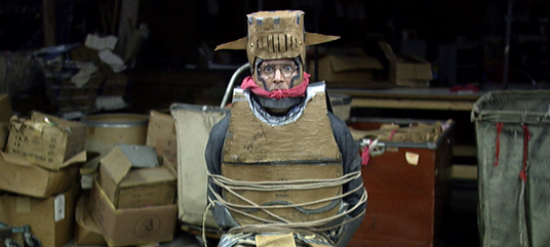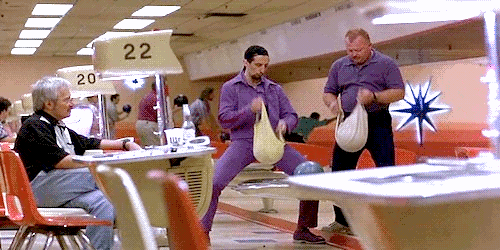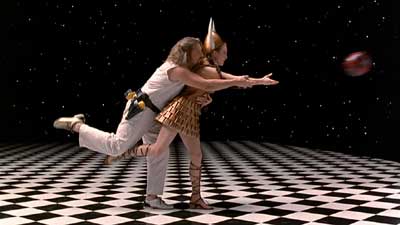
Moderators: Elvis, DrVolin, Jeff





Too true, I often think about the exponential accumulation of data.DrEvil » Sun Dec 20, 2015 1:43 pm wrote:I think one important aspect is that we today have access to so much information.
That was my experience of much of 2015 and was not entirely unexpected. I think the rest of this decade is going to be quite amazing, for good and ill.Wombaticus Rex » Wed Jan 06, 2016 12:28 pm wrote:Universal consensus at a recent bowling party was that January 2016 has abruptly turned mean, palpably mean. It was surprising how much everyone was on the same wavelength, considering how said party was reuniting people from hundreds of miles apart and radically different life circumstances.
Which is to say: be careful out there, everyone. Sharp turns ahead.


- linkUtah G.O.P. Welcomes Cheney and Adopts a New Tone
SANDY, Utah, Aug. 25 2001— Today, for one afternoon at least, the Utah Republican Party appeared united.
Gov. Michael O. Leavitt was not booed. Senator Orrin G. Hatch was not booed. A controversy over whether delegates to the state party's annual convention could carry their guns into the South Towne Exposition Center here never materialized.
And if there was even a lingering doubt that the convention today might generate the kind of unpleasant moments that arose last year, when Mr. Leavitt and Mr. Hatch were attacked as ''liberals'' for several less-than-staunch conservative legislative initiatives, it melted away with the appearance of Vice President Dick Cheney.
As the keynote speaker, Mr. Cheney could not have a received a warmer reception, sure testament to the enduring Republican sway of the state. In one of the first of 33 lines that drew applause from the 1,600 delegates, he reminded the crowd of a moment in last November's election: ''When the Utah vote came in, nobody had to ask for a recount.''
The tone today was markedly different from the convention of 2000, when the party's deep divisions burst into view, pitting conservatives against each other. Mr. Leavitt, who went on to win a third term -- but not before surviving a primary challenge from a right-wing candidate -- was booed for asking the Legislature to deny Utah residents the right to carry their guns into churches and schools.
Mr. Hatch, who went on to win a fifth term, was booed because he had worked with Senator Edward M. Kennedy, Democrat of Massachusetts, on health-care legislation.
Rob Bishop, the departing state party chairman, shook his head today when reminded of the scene last year.
''It's a sign of our success,'' he said, alluding to the stronghold Republicans have here, holding every major state and federal office but one, the Second Congressional District. ''We have a lot of diversity on different issues, and the debate sometimes becomes vitriolic. The bottom line is that for all the hassles we've had, we still win, and that tells you something.''
Today, the audience was respectful of everyone, and no doubt, the presence of Mr. Cheney had a lot to do with it. He approached the lectern to a long and noisy standing ovation, and walked away from it 16 minutes later under the same conditions.
He made no big announcements. Rather, he used his speech to give a review of the Bush administration's first seven months, citing policies that have proved popular with Republicans across the country, like the income tax rebate and President Bush's push for a missile defense system.
His biggest applause came when he referred to President Bush as a commander in chief the military ''can respect,'' an unmistakable criticism of former President Bill Clinton. And for anyone who missed the point, Mr. Cheney drove it home later, saying that Mr. Bush ''has restored honor and integrity to our White House.''
For all the apparent unity, the convention still had a few subtle reminders that the state's Republicans are not always of like mind.
For example, one of the resolutions presented proposed that Utah secede from the union as a way to escape paying federal income taxes. The proposal called for the state to change its status to ''de facto protectorate,'' concluding that ''Utahns would gain far more by being freed from the burdens of the federal income tax than they would by relinquishing their so-called 'representation' in Congress.''
There was also the matter of carrying guns into the convention hall. With Mr. Cheney as the promised keynote speaker, this had become the subject of heated debate in the weeks leading up to the convention.
Utah allows its citizens to carry concealed weapons virtually anywhere, but the Secret Service imposes control over venues where the president and vice president travel, which means no weapons allowed.
By late in the week, a compromise was reached. Delegates with guns were provided lockers outside the exposition center to store them until Mr. Cheney departed. In all, local officials checked 25 guns, all of which were returned to their owners.
One of the first to part with her gun was Sarah Thompson, a retired physician who is executive director of the Utah Gun Owners Alliance. Her organization had opposed any ban on carrying weapons into the hall.
''This was a critical issue for many reasons,'' she said. ''Delegates are entitled to the same right to be safe as anybody else, including the vice president, and the vice president and the Secret Service are not above the laws. In Utah, they should adhere to Utah law.''
''But, she added, ''this was a reasonable agreement.''
Jade Pusey, a representative from the state attorney general's office who was overseeing the collection of guns, said, ''Everybody was cooperative.'' And that included Martin King of West Valley, Utah, an alarms system installer who strolled up to the lockers with a cowboy-style six-shooter tucked inside a holster that was tied to his leg.
''I don't have a permit to carry my gun concealed, so I have to carry it this way,'' he said. ''I don't want to give it up, but I will cooperate in reasonable circumstances like this.''
Photo: Sarah Thompson, leader of the Utah Gun Owners Alliance, who was attending the state's Republican convention, pointed her handgun into an unloading chamber yesterday and pulled the trigger to ensure that it was empty before storing it in a locker outside the convention center. (Tom Smart for The New York Times)
82_28 » Wed Jan 06, 2016 11:44 pm wrote:After Obama's executive decision on guns yesterday, I have little doubt something will happen at least in some way. However meaningless it will ultimately prove to be, it is doubtlessly going to set at least one person off. One person too many. It will be thousands if not millions though who get set off.
California man ranting about Obama’s gun action opens fire on apartments before cops shoot him dead
TRAVIS GETTYS
07 JAN 2016 AT 09:25 ET
Share on Facebook Share on Twitter
Shooting scene (Shutterstock.com)
Don't miss stories. Follow Raw Story!
A California man apparently upset by President Barack Obama’s executive action on gun control opened fire on an apartment complex before police shot him dead.
Witnesses called 911 about 6 p.m. Tuesday to report the man, whose name has not been released, firing indiscriminately at the apartment building in Redding, reported the Record Spotlight.
Kathy Lunsford, who lives in the building, said the man grabbed her and pulled her into his apartment before he started shooting.
“As soon as he shut the door, he hugged me and he kissed me on the forehead,” said Lunsford, who had spoken to the gunman before but said they were not friends.
She said her neighbor then fired at another man, and she begged him to stop.
“He was aiming at a guy, and then he just got sloppy — he was shooting everywhere,” Lunsford said.
Witnesses said the gunman was ranting incoherently about gun control measures proposed by Obama, who announced executive actions earlier that same day intended to keep firearms from being sold to criminals and the mentally ill.
“We heard the five shots — everyone was screaming,” said David Rice, who lives near the apartment complex. “He came out screaming ‘Obama! Obama! Obama!’ (Police) told him to come out with (his) hands up, and he kept telling them ‘No, no, no.’”
Officers fired non-lethal beanbags at the man, who refused to drop his weapon after walking in and out of the apartment at least 10 times, and police shot and killed the gunman after he came out of his apartment with his gun drawn.
One neighbor said police fired at least 30 rounds, but another neighbor said he heard about 70 shots.
“It was insane,” said neighbor Steven Killion.
A neighbor recorded video that shows the man walking out of his apartment’s front door holding the weapon as shots rang out.
Police have confiscated the neighbor’s video and don’t intend to release it to the public.
Users browsing this forum: No registered users and 7 guests